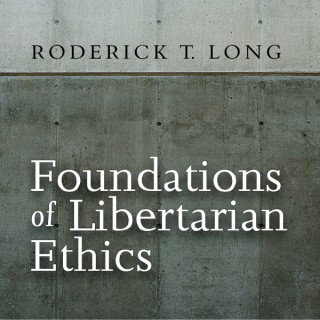Podcasts about philosophy and methodology
- 60PODCASTS
- 711EPISODES
- 49mAVG DURATION
- 1EPISODE EVERY OTHER WEEK
- Feb 10, 2026LATEST
POPULARITY
Best podcasts about philosophy and methodology
Latest podcast episodes about philosophy and methodology
Today, the term "Austrian economics" is used to designate two very different paradigms.This essay was originally published in 1993 in the Review of Austrian Economics, Volume 6, Number 2.
The Austrian School of economics isn't a 20th century or even 19th century creation. Instead, Austrian economics is rooted in the logical thought, as developed by Aristotle and Thomas Aquinas.Original article: https://mises.org/mises-wire/aristotelian-thomistic-roots-austrian-school
The Austrian School of economics isn't a 20th century or even 19th century creation. Instead, Austrian economics is rooted in the logical thought, as developed by Aristotle and Thomas Aquinas.Original article: https://mises.org/mises-wire/aristotelian-thomistic-roots-austrian-school
Elon Musk Claims Money Will Become Irrelevant. Is He Right?
Elon Musk recently claimed that artificial intelligence will make money itself obsolete. He needs to read the literature of Austrian economics.Original article: https://mises.org/mises-wire/elon-musk-claims-money-will-become-irrelevant-he-right
Elon Musk recently claimed that artificial intelligence will make money itself obsolete. He needs to read the literature of Austrian economics.Original article: https://mises.org/mises-wire/elon-musk-claims-money-will-become-irrelevant-he-right
We must realize that the two most powerful motivations in human history have always been ideology and economic interest, and that a joining of these two motivations can be downright irresistible.Original article: https://mises.org/mises-daily/origins-welfare-state-america
We must realize that the two most powerful motivations in human history have always been ideology and economic interest, and that a joining of these two motivations can be downright irresistible.Original article: https://mises.org/mises-daily/origins-welfare-state-america
Dr. David Gordon explains why the leading philosophical defenses of taxation—from Rawls's difference principle to Nagel & Murphy's “myth of ownership”—collapse, and why natural rights still say taxation is theft.Sponsored by Jane Shaffer, in Memory of Butler Shaffer.Recorded at the Mises Supporters Summit in Delray Beach, Florida, on October 17, 2025.
Since the French Revolution, leftism has served as the impetus for many of the state's worst massacres and totalitarian impulses.Original article: https://mises.org/mises-wire/unique-evil-left
Since the French Revolution, leftism has served as the impetus for many of the state's worst massacres and totalitarian impulses.Original article: https://mises.org/mises-wire/unique-evil-left
Is Hans-Hermann Hoppe a firebrand revolutionary, or something very different? On this episode of Minor Issues, Mark Thornton traces Hoppe's American debut in 1986 and follows the controversies that later made Hoppe a lightning rod. The case here is straightforward: Hoppe isn't a political revolutionary aiming to remake society by seizing state power; he's a natural-rights theorist whose analysis—grounded in property, history, and Austrian economics—argues for social cooperation without a predatory state. Hoppe is an exacting analyst of what works, not an architect of upheaval.Additional ResourcesA Life in Liberty: Liber Amicorum in Honor of Hans-Hermann Hoppe, edited by Jörg Guido Hülsmann and Stephan Kinsella (PDF): https://mises.org/MI_135_A Or, purchase the book online: https://mises.org/LiberAmicorum"Understanding the timing and outcome of the Russian Revolution: a public choice approach” (Journal of Public Finance and Public Choice)" by Gregory Dempster, Robert B. Ekelund, Jr., and Mark Thornton: https://mises.org/MI_135_B"Rent Seeking as an Evolving Process: The Case of the Ancien Régime" (Public Choice) by Robert. B. Ekelund, Jr., and Mark Thornton: https://mises.org/MI_135_C"A Theory of Socialism and Capitalism” by Mark Thornton (in Property, Freedom, and Society: Essays in Honor of Hans-Hermann Hoppe): https://mises.org/MI_135_DThe Mises Institute is giving away 100,000 copies of Hayek for the 21st Century. Get your free copy at https://mises.org/IssuesFreeBe sure to follow Minor Issues at https://Mises.org/MinorIssues
Can Econometric Models Fulfill the Role of an Economic Laboratory?
Mainstream economists claim that they can use econometric models to emulate human action and, thus, create an economic laboratory. These models, however, cannot tell us about cause-and-effect, which is vital to understanding praxeology and economic behavior.Original article: https://mises.org/mises-wire/can-econometric-models-fulfill-role-economic-laboratory
Can Econometric Models Fulfill the Role of an Economic Laboratory?
Mainstream economists claim that they can use econometric models to emulate human action and, thus, create an economic laboratory. These models, however, cannot tell us about cause-and-effect, which is vital to understanding praxeology and economic behavior.Original article: https://mises.org/mises-wire/can-econometric-models-fulfill-role-economic-laboratory
Economist Joseph Salerno, an expert on the Austrian School, money, and methodology, joins us to talk about what makes the Austrian School of economics different. Be sure to follow Radio Rothbard at https://Mises.org/RadioRothbardRadio Rothbard mugs are available at the Mises Store. Get yours at https://Mises.org/RothMug PROMO CODE: RothPod for 20% off
Economist Joseph Salerno, an expert on the Austrian School, money, and methodology, joins us to talk about what makes the Austrian School of economics different. Be sure to follow Radio Rothbard at https://Mises.org/RadioRothbardRadio Rothbard mugs are available at the Mises Store. Get yours at https://Mises.org/RothMug PROMO CODE: RothPod for 20% off
Many "social justice" advocates claim to appeal to a “higher law,” but they usually refuse to acknowledge economic laws because those laws stand in their way of creating the "just" society.Original article: https://mises.org/mises-wire/austrian-perspectives-social-justice
Many "social justice" advocates claim to appeal to a “higher law,” but they usually refuse to acknowledge economic laws because those laws stand in their way of creating the "just" society.Original article: https://mises.org/mises-wire/austrian-perspectives-social-justice
Can Surveys Provide Insight Into the State of the Economy?
Surveys used to gauge optimism or pessimism about the economy may be interesting to read, but unless they are the product of sound and realistic economic theory, they are not economically useful.Original article: https://mises.org/mises-wire/can-surveys-provide-insight-state-economy
Surveys used to gauge optimism or pessimism about the economy may be interesting to read, but unless they are the product of sound and realistic economic theory, they are not economically useful.Original article: https://mises.org/mises-wire/can-surveys-provide-insight-state-economy
Even when MMT advocates are correct that colonial governments at times burned money after receiving it for tax revenues, they still manage to get both the history and the causes wrong. Original article: https://mises.org/mises-wire/mmters-love-when-governments-burn-money
How Psychology Is Catching Up with the Reality of Human Action
Modern psychology has been at odds with the praxeology of the Austrian School, as psychologists have tended to see humans as passive and reactive, while Austrians view human action as purposeful. Recent developments in the field might change that narrative.Original article: https://mises.org/mises-wire/how-psychology-catching-reality-human-action
Even when MMT advocates are correct that colonial governments at times burned money after receiving it for tax revenues, they still manage to get both the history and the causes wrong. Original article: https://mises.org/mises-wire/mmters-love-when-governments-burn-money
How Psychology Is Catching Up with the Reality of Human Action
Modern psychology has been at odds with the praxeology of the Austrian School, as psychologists have tended to see humans as passive and reactive, while Austrians view human action as purposeful. Recent developments in the field might change that narrative.Original article: https://mises.org/mises-wire/how-psychology-catching-reality-human-action
Rethinking Sociology with Mises: A New Austro-Libertarian Framework for Understanding Society
Is Austrian Economics compatible with modern sociology, which is presently dominated by collectivists? However, it is possible to apply praxeology to sociology analysis, and that is where one begins to approach this discipline in a manner that promotes liberty.Original article: https://mises.org/mises-wire/rethinking-sociology-mises-new-austro-libertarian-framework-understanding-society
The Silent Guardian of Liberty: Hans F. Sennholz and the Seed of Mises in America
The biography of Hans F. Sennholz reads like a paradoxical novel—as if the protagonist had journeyed backward through the twentieth century.Original article: https://mises.org/power-market/silent-guardian-liberty-hans-f-sennholz-and-seed-mises-america
Rethinking Sociology with Mises: A New Austro-Libertarian Framework for Understanding Society
Is Austrian Economics compatible with modern sociology, which is presently dominated by collectivists? However, it is possible to apply praxeology to sociology analysis, and that is where one begins to approach this discipline in a manner that promotes liberty.Original article: https://mises.org/mises-wire/rethinking-sociology-mises-new-austro-libertarian-framework-understanding-society
The Silent Guardian of Liberty: Hans F. Sennholz and the Seed of Mises in America
The biography of Hans F. Sennholz reads like a paradoxical novel—as if the protagonist had journeyed backward through the twentieth century.Original article: https://mises.org/power-market/silent-guardian-liberty-hans-f-sennholz-and-seed-mises-america
The Questionable Role of Quantitative Methods in Economics
Austrian economics veers sharply from the economic mainstream over the use of mathematics and quantitative measures. Instead, Austrians build upon irrefutable premises based upon human action.Original article: https://mises.org/mises-wire/questionable-role-quantitative-methods-economics
Austrian economics veers sharply from the economic mainstream over the use of mathematics and quantitative measures. Instead, Austrians build upon irrefutable premises based upon human action.Original article: https://mises.org/mises-wire/questionable-role-quantitative-methods-economics
Jesús Huerta de Soto has published a series of lectures on Austrian Economics, and Dr. David Gordon in Friday Philosophy reviews his Lectures in Austrian Economics, Volume 1. Dr. Gordon is especially interested in how de Soto deals with time.Original article: https://mises.org/friday-philosophy/invasion-spatializers
Socialists despise individual liberty because they believe that allowing humans to make free choices supposedly leads to selfish and anti-social behavior. However, by denying individual choice, socialists are denying human action itself.Original article: https://mises.org/mises-wire/axiom-action-and-inescapability-liberty
Socialists despise individual liberty because they believe that allowing humans to make free choices supposedly leads to selfish and anti-social behavior. However, by denying individual choice, socialists are denying human action itself.Original article: https://mises.org/mises-wire/axiom-action-and-inescapability-liberty
Jesús Huerta de Soto has published a series of lectures on Austrian Economics, and Dr. David Gordon in Friday Philosophy reviews his Lectures in Austrian Economics, Volume 1. Dr. Gordon is especially interested in how de Soto deals with time.Original article: https://mises.org/friday-philosophy/invasion-spatializers
Mises University begins Sunday, July 20, and given that misinformation abounds about the economy, it is good to have a forum where students can learn economic truths and stretch their minds.Original article: https://mises.org/mises-wire/why-mises-university-matters
Mises University begins Sunday, July 20, and given that misinformation abounds about the economy, it is good to have a forum where students can learn economic truths and stretch their minds.Original article: https://mises.org/mises-wire/why-mises-university-matters
A central belief of collectivists is that people think collectively, too. Whether one is a member of a class, religious group, or ethnic group, collectivism holds that each group has distinct interests that determine how individuals in the group think. Mises would have disagreed.Original article: https://mises.org/mises-wire/mythology-methodological-collectivism
A central belief of collectivists is that people think collectively, too. Whether one is a member of a class, religious group, or ethnic group, collectivism holds that each group has distinct interests that determine how individuals in the group think. Mises would have disagreed.Original article: https://mises.org/mises-wire/mythology-methodological-collectivism
The Young Rothbard: An Uncomfortable Neoclassical Economist
Speaking at the recent Rothbard Graduate Seminar, Dr. Joseph Salerno traces Murray Rothbard‘s intellectual development while in the economics Ph.D. program at Columbia University. Rothbard was dissatisfied with the popular schools of thought until he discovered Austrian economics.Original article: https://mises.org/mises-wire/young-rothbard-uncomfortable-neoclassical-economist
Speaking at the recent Rothbard Graduate Seminar, Dr. Joseph Salerno traces Murray Rothbard‘s intellectual development while in the economics Ph.D. program at Columbia University. Rothbard was dissatisfied with the popular schools of thought until he discovered Austrian economics.Original article: https://mises.org/mises-wire/young-rothbard-uncomfortable-neoclassical-economist
College professors have suddenly discovered entrepreneurship and are teaching about it in their classes. However, while it is an interesting subject, one cannot teach someone how to be a successful entrepreneur. Original article: https://mises.org/mises-wire/entrepreneurship-cant-be-taught-college-classroom
College professors have suddenly discovered entrepreneurship and are teaching about it in their classes. However, while it is an interesting subject, one cannot teach someone how to be a successful entrepreneur. Original article: https://mises.org/mises-wire/entrepreneurship-cant-be-taught-college-classroom
The transatlantic slave trade from Africa is a well-known chapter in the history of slavery in the Western Hemisphere, but much lesser known is the enslavement of Native Americans. Many of them were shipped to plantations in the Caribbean where they were worked to death.Original article: Truth or Consequences
The transatlantic slave trade from Africa is a well-known chapter in the history of slavery in the Western Hemisphere, but much lesser known is the enslavement of Native Americans. Many of them were shipped to plantations in the Caribbean where they were worked to death.Original article: Truth or Consequences
Dr. Jonathan Newman returns to the Human Action Podcast to discuss the relaunch of the Mises Academy—including his new course based on Bob's Lessons for the Young Economist textbook. But this conversation goes much deeper than curriculum. Bob and Jonathan unpack the fundamental question: What is economics, really? They explore how Austrian economics differs from psychology, history, and the natural sciences, why economics is more about understanding than prediction, and how praxeology reveals the logical structure of human choice.The New Mises Academy: Mises.org/HAP498aBob's Lessons for the Young Economist Textbook: Mises.org/HAP498bBob's Lessons for the Young Economist Teacher's Manual: Mises.org/HAP498cThe Mises Institute is giving away 100,000 copies of Murray Rothbard's, What Has Government Done to Our Money? Get your free copy at Mises.org/HAPodFree
Dr. Jonathan Newman returns to the Human Action Podcast to discuss the relaunch of the Mises Academy—including his new course based on Bob's Lessons for the Young Economist textbook. But this conversation goes much deeper than curriculum. Bob and Jonathan unpack the fundamental question: What is economics, really? They explore how Austrian economics differs from psychology, history, and the natural sciences, why economics is more about understanding than prediction, and how praxeology reveals the logical structure of human choice.The New Mises Academy: Mises.org/HAP498aBob's Lessons for the Young Economist Textbook: Mises.org/HAP498bBob's Lessons for the Young Economist Teacher's Manual: Mises.org/HAP498cThe Mises Institute is giving away 100,000 copies of Murray Rothbard's, What Has Government Done to Our Money? Get your free copy at Mises.org/HAPodFree
The Austrian school recognizes that economic analysis is timeless and the ancient story of “The Poor Man of Nippur” provides an excellent example. From time preference to the structure of production, many of the lessons are contained in this story.Original article: The Poor Man of Nippur and Austrian Economic Principles
The Austrian school recognizes that economic analysis is timeless and the ancient story of “The Poor Man of Nippur” provides an excellent example. From time preference to the structure of production, many of the lessons are contained in this story.Original article: The Poor Man of Nippur and Austrian Economic Principles
Mainstream economists today examine economic phenomena from a “black box” perspective in which they look at inputs and outputs without trying to understand causal mechanisms that make the outcomes possible.Original article: A Critique of Black Box Economics
The Relevance of the Natural Sciences Methods in Economics
Modern academic economics is based upon the methodologies used to study the natural sciences. However, such methodologies are inappropriate to study economics, which must be based upon causal-realism.Original article: The Relevance of the Natural Sciences Methods in Economics
Austrian economics today needs critics. It doesn‘t need the critics (like Paul Krugman) who cannot give valid and accurate criticisms, but rather people who actually understand the concepts upon which Austrian thinking is built provide a real challenge.Original article: Wanted: Critics of Austrian Economics






























